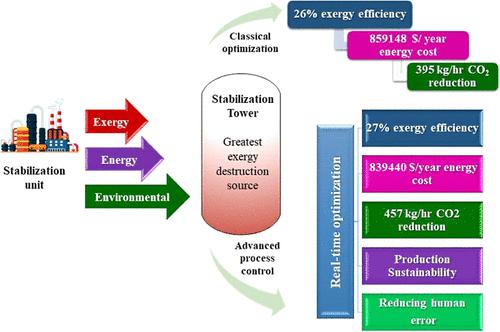当前位置:
X-MOL 学术
›
Ind. Eng. Chem. Res.
›
论文详情
Our official English website, www.x-mol.net, welcomes your
feedback! (Note: you will need to create a separate account there.)
Advanced Process Control Strategy for a Condensate Stabilization Unit: Energy, Exergy, Economic, and Environmental (4E) Study
Industrial & Engineering Chemistry Research ( IF 3.8 ) Pub Date : 2023-02-22 , DOI: 10.1021/acs.iecr.2c02964 Hamid Shafiei 1 , Reza Azin 2 , Shahriar Osfouri 1 , Mohamad Mohamadi-Baghmolaei 3
Industrial & Engineering Chemistry Research ( IF 3.8 ) Pub Date : 2023-02-22 , DOI: 10.1021/acs.iecr.2c02964 Hamid Shafiei 1 , Reza Azin 2 , Shahriar Osfouri 1 , Mohamad Mohamadi-Baghmolaei 3
Affiliation

|
This study assesses the energy, exergy, economic, and environmental performance of a gas stabilization unit by employing a new strategy to implement an advanced control system. The advanced process control (APC) strategy is established based on the response surface methodology to assess the real-time performance of the process. The RSM-based APC technique targets the energy, exergy, economic, and environmental (4E) performance of the process in unsteady-state operations. A detailed sensitivity analysis is also conducted to evaluate the relative significance of operating parameters on the objective functions, such as exergy efficiency, energy cost, and CO2 emission. The RSM-based APC strategy proposes an algorithm that can readily be implemented in the plant to increase the plant’s energy performance. Implementing this intelligent control system leads to the production of standard products, while production cost, energy consumption, exergy efficiency, and environmental impacts are enhanced. The exergy and sensitivity results indicate that the stabilization tower has the highest potential for process enhancement, and reboiler temperature is the most influential factor among operating parameters. Also, the RSM-based APC improves the exergy efficiency of the plant by 19% and reduces the energy cost by 13%. At the optimal state, 457 kg/h CO2 emission is prevented.
中文翻译:

凝析油稳定装置的先进过程控制策略:能源、火用、经济和环境 (4E) 研究
本研究通过采用新策略实施先进控制系统来评估气体稳定装置的能源、火用、经济和环境性能。基于响应面方法建立先进过程控制(APC)策略,以评估过程的实时性能。基于 RSM 的 APC 技术以非稳态操作过程的能量、火用、经济和环境 (4E) 性能为目标。还进行了详细的敏感性分析,以评估运行参数对目标函数的相对重要性,例如火用效率、能源成本和 CO 2排放。基于 RSM 的 APC 策略提出了一种算法,该算法可以很容易地在工厂中实施,以提高工厂的能源性能。实施这种智能控制系统可以生产标准产品,同时提高生产成本、能源消耗、火用效率和环境影响。火用和灵敏度结果表明,稳定塔具有最大的工艺改进潜力,再沸器温度是运行参数中影响最大的因素。此外,基于 RSM 的 APC 将电厂的火用效率提高了 19%,并将能源成本降低了 13%。在最佳状态下,可防止457 kg/h CO 2排放。
更新日期:2023-02-22
中文翻译:

凝析油稳定装置的先进过程控制策略:能源、火用、经济和环境 (4E) 研究
本研究通过采用新策略实施先进控制系统来评估气体稳定装置的能源、火用、经济和环境性能。基于响应面方法建立先进过程控制(APC)策略,以评估过程的实时性能。基于 RSM 的 APC 技术以非稳态操作过程的能量、火用、经济和环境 (4E) 性能为目标。还进行了详细的敏感性分析,以评估运行参数对目标函数的相对重要性,例如火用效率、能源成本和 CO 2排放。基于 RSM 的 APC 策略提出了一种算法,该算法可以很容易地在工厂中实施,以提高工厂的能源性能。实施这种智能控制系统可以生产标准产品,同时提高生产成本、能源消耗、火用效率和环境影响。火用和灵敏度结果表明,稳定塔具有最大的工艺改进潜力,再沸器温度是运行参数中影响最大的因素。此外,基于 RSM 的 APC 将电厂的火用效率提高了 19%,并将能源成本降低了 13%。在最佳状态下,可防止457 kg/h CO 2排放。

































 京公网安备 11010802027423号
京公网安备 11010802027423号